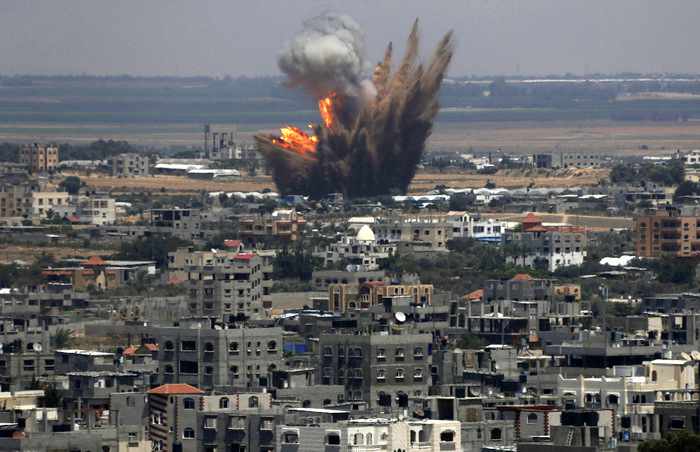Gaza dead reach 78 as Israelis hint at invasion

– World news selected by Gazette editors for Phuket’s international community
PHUKET: At least 78 Palestinians, most of them civilians, have been killed in Israel’s Gaza offensive, Palestinian officials said on Thursday as militants in the enclave kept up rocket attacks on Tel Aviv, Jerusalem and other cities.
As Israeli officials seemed to hint at a possible invasion by ground forces, eight members of one family, including five children, were killed in an early morning air strike that levelled two homes at Khan Younis in the south of the Gaza Strip near the Egyptian border, the Palestinian Health ministry said.
Israel’s military made no comment on what would be the deadliest strike since its began its assault on Tuesday. The defence minister spoke of “long days of fighting ahead”.
French President Francois Hollande voiced his concern at the civilian deaths in the Palestinian enclave and called for a truce. A spokeswoman for U.S. Secretary of State John Kerry, who like Hollande spoke to Palestinian President Mahmoud Abbas, said of possible escalation: “Nobody wants to see a ground invasion.”
The offensive followed a build-up in violence after three Jewish students were killed in the occupied West Bank last month and a Palestinian youth died in a suspected revenge attack.
Medical officials in Hamas-dominated Gaza said at least 60 civilians, including a four-year-old girl and a boy aged five who were killed on Thursday, were among the 78 Palestinians who have died in Israeli attacks since Tuesday.
Israeli Prime Minister Benjamin Netanyahu said in a televised statement: “So far the battle is progressing as planned but we can expect further stages in future. Up to now, we have hit Hamas and the terror organisations hard and as the battle continues we will increase strikes at them.”
Netanyahu discussed options with his security cabinet as air strikes continued and officials hinted at a possible ground offensive, there was no word on when or if this would happen.
“We have long days of fighting ahead of us,” Defence Minister Moshe Yaalon said.
KNIFE EDGE
Sirens sounded in and around Jerusalem in the evening and residents ran for cover as a number of rockets were launched towards the holy city. Two were intercepted and others fell in open ground. The remnants of one rocket fell on a building in an Israeli community in the hills near Jerusalem, police said.
Militants from Hamas’s Qassam Brigades and the smaller Islamic Jihad group said they had launched separate strikes.
The only Israeli casualties on Thursday were two people who had minor wounds when a mortar exploded near the Gaza border.
U.N. Secretary-General Ban Ki-moon, who was to brief the Security Council on the crisis later on Thursday, condemned the rocket attacks and urged Israel to show restraint. “Gaza is on a knife edge,” he told reporters.
Israel says it has struck more than 860 targets in an offensive intended to halt persistent rocket fire at its own civilian population, which escalated after Israeli forces arrested hundreds of Hamas activists in the West Bank while hunting for the abducted teenagers.
It says Hamas Islamists put innocent Palestinians in harm’s way by placing weaponry and gunmen in residential areas. The movement has widespread support among Palestinians.
SMOKE AND RUBBLE
Across the Gaza Strip, smoke and rubble marked the aftermath of Israeli attacks in the most serious hostilities between the militants and Israel’s powerful armed forces in two years.
“The Jews say they are fighting Hamas and fighting gunmen while all the bodies we have seen on television are those of women and children,” said Khaled Ali, 45, a Gaza taxi driver.
Rocket salvoes on Israel – the military said more than 470 projectiles have been fired since Tuesday, including some 170 on Thursday alone – have caused no fatalities or serious injuries. That has been due in part to interception by Israel’s partly U.S.-funded Iron Dome aerial defence system.
The wail of air raid sirens has paralysed business in southern communities and sent hundreds of thousands of people scrambling for shelter in Tel Aviv, the commercial capital where two rockets were shot down on Thursday. But offices and shops remain open and roads are clogged with traffic.
One rocket fell in the West Bank between Jerusalem and Abbas’s administrative centre Ramallah. It landed in open ground close to a Palestinian home. Some rockets have landed more than 100 km (60 miles) from Gaza.
Hamas spokesman Sami Abu Zuhri sounded a defiant note, when asked about defence minister Yaalon’s remarks of further action to come. “Our backs are to the wall and we have nothing to lose,” he said. “We are ready to battle until the end.”
KNOCK ON THE DOOR
Israel’s targets in the Gaza Strip have included militant commanders’ homes, which it described as command and control centres. Palestinian officials put the number of dwellings either destroyed or damaged at more than 120. Local residents said some of the houses did not belong to fighters.
Netanyahu has accused Hamas of committing “a double war crime” by targeting Israeli civilians “while hiding behind Palestinian civilians”.
Owners of some of the targeted homes received telephoned warnings from Israel to get out. In other cases, so-called “knock-on-the-door” missiles, which do not carry explosive warheads, were first fired as a signal to evacuate. Scenes of families fleeing their homes have played out daily.
Israeli leaders, who have popular support for the Gaza offensive, have mobilised some 20,000 army reservists, giving them the means, if they choose, to mount a land offensive in one of the world’s most densely populated territories.
The last time they did that was in early 2009. Ground troops did not cross into the Strip during the last major exchange of rockets and missiles in October 2012.
U.S.-backed Palestinian President Abbas, who is based in the West Bank and entered a power-sharing deal with Hamas in April after years of feuding, has denounced the Israeli offensive.
In telephone calls with U.S. Secretary of State John Kerry and Turkish Prime Minister Tayyip Erdogan, Abbas “stressed the need to achieve a ceasefire immediately”, the official Palestinian news agency WAFA said.
— Phuket Gazette Editors
Latest Thailand News
Follow The Thaiger on Google News:


























